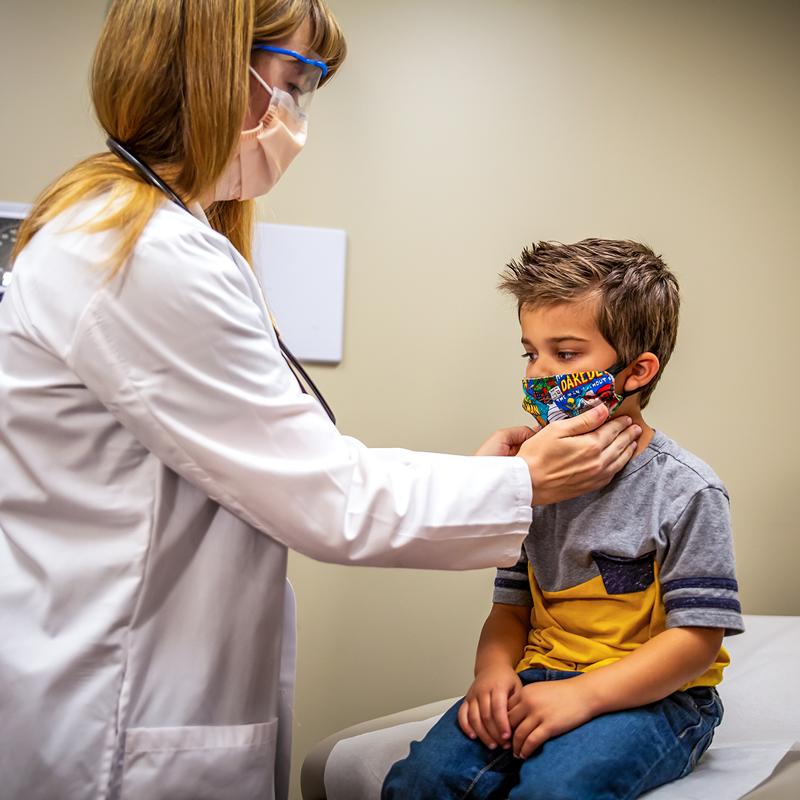Most lumps and cysts under the skin are nothing to worry about. But when it’s your child, you want an expert to make sure. At University of Utah Health, our experienced pediatric surgeons have cared for thousands of kids with these conditions. They work with a team of nurses, child life specialists, anesthesiologists and other caring providers to offer high-quality treatment that’s friendly and convenient for your family.
Our pediatric surgeons offer appointments at U of U Health Riverton Hospital and Primary Children’s Hospital in Salt Lake City, as well as at clinics in Provo and Billings, Montana.
Find A Pediatric Surgeon
Learn About Pediatric Cysts and Lumps
Pediatric cysts and lumps are lesions on the skin or under the surface of the skin, and they are rarely cause for concern. A cyst is filled with fluid and a lump is not.
Types of Pediatric Cysts and Lumps
The most common types of pediatric cysts and lumps include:
- Dermoid cyst. This cyst typically appears as a small, firm, painless lump. Occasionally these are painful and they also may drain pus.
- Pilomatrixoma. These lesions form when cells abnormally harden and form a mass under the skin. The cells involved are similar to hair follicle cells.
- Lipoma. This lesion is a small, fatty tumor.
- Skin tags. These small growths are raised or may hang from the skin.
- Small lymphatic malformations. These occur when fluid that is part of the body’s immune system doesn’t flow properly. Extra fluid collects inside cysts under the skin or sacs on top of the skin.


Diagnosing Pediatric Cysts and Lumps
During the evaluation, the pediatric surgeon will examine the lesion. Your child may need an X-ray or ultrasound, but this is uncommon. The surgeon will ask questions about your child's medical history to make sure the lesion isn't related to another medical condition that could affect his or her treatment recommendations.
If your child's skin lesion is not painful and hasn't been growing, the pediatric surgeon may decide there is no need to remove it.
If the surgeon recommends removing it, the surgery is typically outpatient. If you are not doing the same-day option, you can schedule the surgery for a later date before you leave the clinic.
If the lesion is on your child's face or on another noticeable location, the pediatric surgeon may refer you to a plastic surgeon.
Surgery for Pediatric Lumps and Cysts
Surgeries to remove pediatric lumps and cysts are almost always outpatient surgeries, and usually happen at U of U’s Riverton Hospital. Our care team will provide pre-surgery instructions before the day of your child’s surgery.
Your child will not be awake for the surgery. Instead, he or she will be given general anesthesia. You will meet the pediatric anesthesiologist right before the procedure.
Our pediatric surgeons will remove the lesion using the smallest incision possible to ensure a cosmetically appealing result. The wound will be closed using dissolvable stitches beneath the skin, or with another method to minimize scarring.
After removing the lesion, the surgeon will send it to the pathology lab for testing, just to be sure it is not cancerous. Fewer than 1% of pediatric lumps and cysts are cancerous. If the lab results are concerning, the pediatric surgeon will provide you with a referral for follow-up care with a specialist.
Most children return home the same day. The care team will provide you with instructions about wound care and your child’s recovery before you return home.
Your Child’s Follow-Up Care
Recovery usually is a quick process. If the surgery was minor, your child might not need a follow-up appointment. You are always welcome to call your provider’s office with questions or concerns.
Making an Appointment
Physician referrals are welcome but not necessary when making an appointment with one of our pediatric surgeons. To request an appointment, call 801-662-2950 or complete our online form.
One of our team members will let you know whether your child qualifies for our same-day option and will schedule your appointment accordingly.

